瞬间动词转换成持续性动词(学习内容)
- 格式:doc
- 大小:35.50 KB
- 文档页数:3

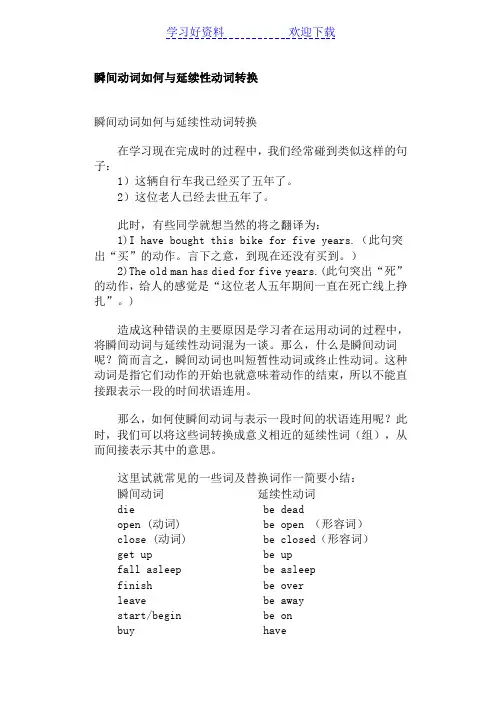
瞬间动词如何与延续性动词转换瞬间动词如何与延续性动词转换在学习现在完成时的过程中,我们经常碰到类似这样的句子:1)这辆自行车我已经买了五年了。
2)这位老人已经去世五年了。
此时,有些同学就想当然的将之翻译为:1)I have bought this bike for five years.(此句突出“买”的动作。
言下之意,到现在还没有买到。
)2)The old man has died for five years.(此句突出“死”的动作,给人的感觉是“这位老人五年期间一直在死亡线上挣扎”。
)造成这种错误的主要原因是学习者在运用动词的过程中,将瞬间动词与延续性动词混为一谈。
那么,什么是瞬间动词呢?简而言之,瞬间动词也叫短暂性动词或终止性动词。
这种动词是指它们动作的开始也就意味着动作的结束,所以不能直接跟表示一段的时间状语连用。
那么,如何使瞬间动词与表示一段时间的状语连用呢?此时,我们可以将这些词转换成意义相近的延续性词(组),从而间接表示其中的意思。
这里试就常见的一些词及替换词作一简要小结:瞬间动词延续性动词die be deadopen (动词) be open (形容词)close (动词) be closed(形容词)get up be upfall asleep be asleepfinish be overleave be awaystart/begin be onbuy haveborrow keepcatch a cold have a coldjoin (1) be a + 成员;职业(2) be in+ 集团;组织;单位实战演练:一、同义句转换1. He came here three years ago.He ___________ ___________ here for three years.2. School finished a month ago.School ___________ ___________ ___________for a month.3. He borrowed this book a week ago.He___________ ___________ this book for a week.4. The factory opened ten years ago.The factory ___________ ______________________ for ten years5. The man joined the army two years ago.The man ___________ ___________ a soldier since two years ago.6. Mary arrived in Shanghai last year.Mary ___________ ___________ ___________ Shanghai since a year ago.7. She got up an hour ago.She ___________ ___________ ___________ for an hour.8. He bought this book three weeks ago.He ___________ ___________ this book for threeweeks.9. The film began an hour ago.The film ___________ ___________ ___________for an hour.10. How long ___________ you ___________ this book? (borrow)11. I bought the pencil about three months ago.I ___________ ___________ the pencil since three months ago.12. Jim left England three years ago.Jim ___________ ___________ ______________________England for three years.13. He left here last yearHe ___________ ___________ ___________ here for a year.14. Li Lei came back two weeks ago.________________________________15.The man died five years ago.________________________________二、根据中英文提示完成句子1、史密斯来中国已经三年了。
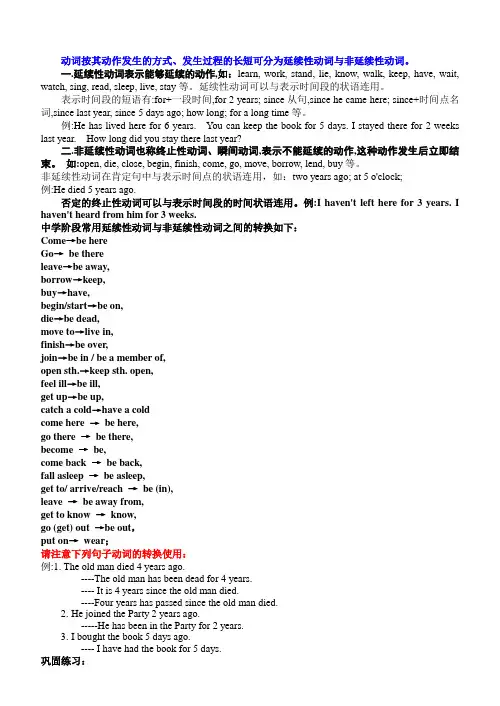
动词按其动作发生的方式、发生过程的长短可分为延续性动词与非延续性动词。
一.延续性动词表示能够延续的动作,如:learn, work, stand, lie, know, walk, keep, have, wait, watch, sing, read, sleep, live, stay等。
延续性动词可以与表示时间段的状语连用。
表示时间段的短语有:for+一段时间,for 2 years; since从句,since he came here; since+时间点名词,since last year, since 5 days ago; how long; for a long time等。
例:He has lived here for 6 years. You can keep the book for 5 days. I stayed there for 2 weeks last year. How long did you stay there last year?二.非延续性动词也称终止性动词、瞬间动词,表示不能延续的动作,这种动作发生后立即结束。
如:open, die, close, begin, finish, come, go, move, borrow, lend, buy等。
非延续性动词在肯定句中与表示时间点的状语连用,如:two years ago; at 5 o'clock;例:He died 5 years ago.否定的终止性动词可以与表示时间段的时间状语连用。
例:I haven't left here for 3 years. I haven't heard from him for 3 weeks.中学阶段常用延续性动词与非延续性动词之间的转换如下:Come→be hereGo→be thereleave→be away,borrow→keep,buy→have,begin/start→be on,die→be dead,move to→live in,finish→be over,join→be in / be a member of,open sth.→keep sth. open,feel ill→be ill,get up→be up,catch a cold→have a coldcome here →be here,go there →be there,become →be,come back →be back,fall asleep →be asleep,get to/ arrive/reach →be (in),leave →be away from,get to know →know,go (get) out →be out,put on→wear;请注意下列句子动词的转换使用:例:1. The old man died 4 years ago.----The old man has been dead for 4 years.---- It is 4 years since the old man died.----Four years has passed since the old man died.2.He joined the Party 2 years ago.-----He has been in the Party for 2 years.3.I bought the book 5 days ago.---- I have had the book for 5 days.巩固练习:1. When he arrived at the bus stop, the bus ________ for 20 minutes.A. has leftB. had leftC. has been awayD. had been away2. I ______ the League for 5 years so far.A. joinedB. have joinedC. have been inD. have gone to3. The factory ________ since the February of 1988.A . has been open B. has opened C. was open D. opened4. Mary and Rose _______friends since they met in 2000.A. have madeB. have beenC. madeD. have become5. You mustn't ________ until he comes back.A. be awayB. leaveC. be leftD. have left6. The meeting _______ for a week now.A. has finishedB. has endedC. has been overD. ended7. Miss Gao ______ this school for nearly 5 years.A. has been inB. has come toC. has taughtD. taught8. Ben ______ a teacher for 4 years .A. has beenB. has becomeC. wasD. became9. I ______ home for a week.A. have returnedB. have been backC. returnedD. am returned10. How long _______ he ________ ?A. diedB. has, diedC. has, been deadD. did, died11. He ______ at eight yesterday afternoon.A. sleptB. was sleepingC. has sleepD. had slept12. He ________ the car for a week.A. boughtB. has boughtC. has hadD. buy13. -----How long _____ you _____ ill? -----Two weeks.A. did fallB. have, fellC. have, beenD. have, had14. Since 2000, he _____ his hometown.A. has leftB. has moved awayC. has been away fromD. left15. I'll lend you the book , but you can only _____ it for 2 days.A. borrowB. keepC. takeD. took16. The bus ______ on the road for 2 hours so far.A. has stoppedB. stoppedC. has beenD. is17. Are you _____ the jacket these days?A. wearingB. putting onC. dressingD. on18. He ________ for 2 hours.A. got upB. has got upC. has been upD. is up19. Tom is ill in hospital. He _______ a cold for several days.A. isB. catchesC. has caughtD. has had20. ----- How long can I ______ the book? ------ Two weeks.A. borrowB. lendC. getD. KeepKey:1---5 D C A B B; 6---10 C A A B C; 11---15 B C C C B; 16---20 C A C D D。

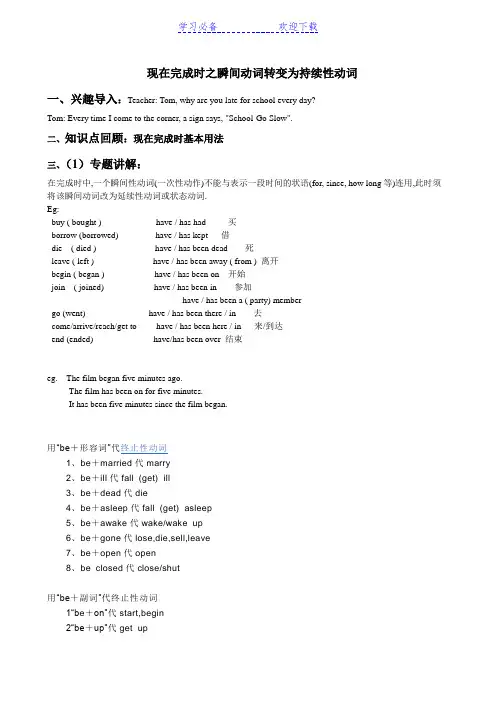
现在完成时之瞬间动词转变为持续性动词一、兴趣导入:Teacher: Tom, why are you late for school every day?Tom: Every time I come to the corner, a sign says, "School-Go Slow".二、知识点回顾:现在完成时基本用法三、(1)专题讲解:在完成时中,一个瞬间性动词(一次性动作)不能与表示一段时间的状语(for, since, how long等)连用,此时须将该瞬间动词改为延续性动词或状态动词.Eg:buy ( bought ) --- have / has had 买borrow (borrowed) --- have / has kept 借die ( died ) --- have / has been dead 死leave ( left ) --- have / has been away ( from ) 离开begin ( began ) --- have / has been on 开始join ( joined) --- have / has been in 参加--- have / has been a ( party) membergo (went) --- have / has been there / in 去come/arrive/reach/get to --- have / has been here / in 来/到达end (ended) ----- have/has been over 结束eg. The film began five minutes ago.------The film has been on for five minutes.------It has been five minutes since the film began.用“be+形容词”代终止性动词1、be+married代marry2、be+ill代fall (get) ill3、be+dead代die4、be+asleep代fall (get) asleep5、be+awake代wake/wake up6、be+gone代lose,die,sell,leave7、be+open代open8、be closed代close/shut用“be+副词”代终止性动词1“b e+on”代start,begin2“be+up”代get up3“be+back(to)”代return to,come back to,go back to4“be here (there)”代come(arrive,reach,get) here或go (arrive,reach,get) there等等用“be+介词短语”代终止性动词1.“be in/at +地点”代替go to /come to2.用be in the army 代替join the army3.“be in/at +地点”代替move to四、巩固练习:将瞬间动词变成延续性动词表:1. have arrived at/in....... got to/reached...... come/gone/moved to...... →2. have come/gone back/returned →3. have come/g one out →4. have become →5. have closed / opened→6. have fallen ill→7. have died →8. have left...... →9. have fallen asleep/got to sleep →10. have finished/ended/completed →11. have married →12. have begun →13. have borrowed/bought →14. have/has gone to →15. have joined/have taken part in the league/the Party/the army→五、拓展训练:1.你曾经吃过鱼和薯条吗?2. 我刚刚丢了我的化学书。
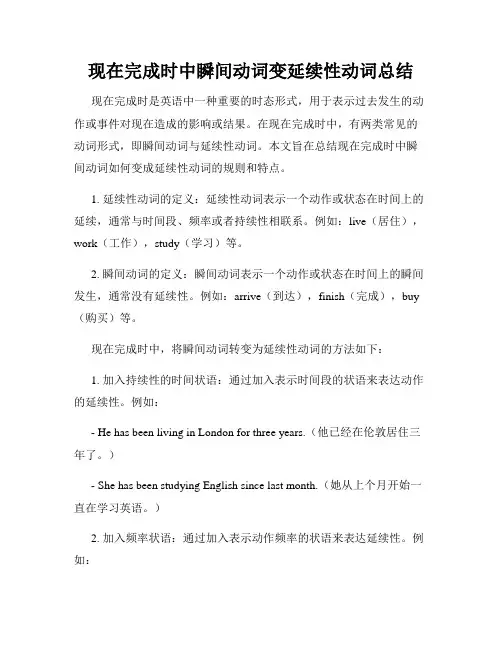
现在完成时中瞬间动词变延续性动词总结现在完成时是英语中一种重要的时态形式,用于表示过去发生的动作或事件对现在造成的影响或结果。
在现在完成时中,有两类常见的动词形式,即瞬间动词与延续性动词。
本文旨在总结现在完成时中瞬间动词如何变成延续性动词的规则和特点。
1. 延续性动词的定义:延续性动词表示一个动作或状态在时间上的延续,通常与时间段、频率或者持续性相联系。
例如:live(居住),work(工作),study(学习)等。
2. 瞬间动词的定义:瞬间动词表示一个动作或状态在时间上的瞬间发生,通常没有延续性。
例如:arrive(到达),finish(完成),buy (购买)等。
现在完成时中,将瞬间动词转变为延续性动词的方法如下:1. 加入持续性的时间状语:通过加入表示时间段的状语来表达动作的延续性。
例如:- He has been living in London for three years.(他已经在伦敦居住三年了。
)- She has been studying English since last month.(她从上个月开始一直在学习英语。
)2. 加入频率状语:通过加入表示动作频率的状语来表达延续性。
例如:- They have been playing tennis every weekend.(他们每个周末都在打网球。
)- I have been working out at the gym twice a week.(我每周在健身房锻炼两次。
)3. 加入表示动作状态的状语:通过加入表示动作状态的状语来表达延续性。
例如:- The team has been practicing hard for the upcoming tournament.(这个团队一直在为即将到来的比赛进行努力训练。
)- She has been studying diligently for her exams.(她为了考试一直努力学习。
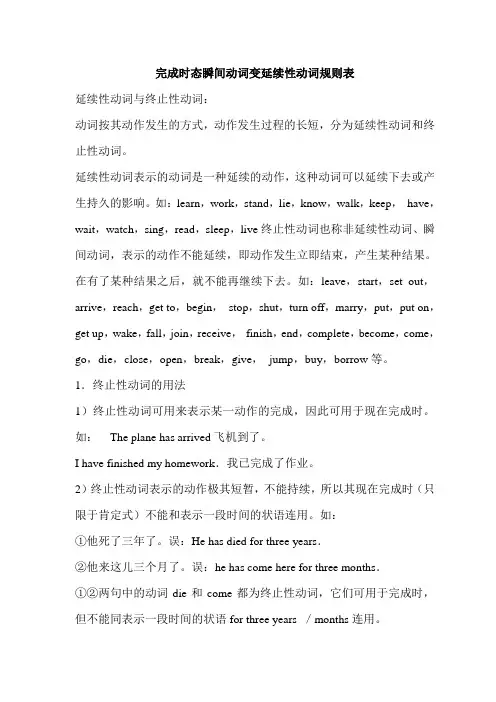
完成时态瞬间动词变延续性动词规则表延续性动词与终止性动词:动词按其动作发生的方式,动作发生过程的长短,分为延续性动词和终止性动词。
延续性动词表示的动词是一种延续的动作,这种动词可以延续下去或产生持久的影响。
如:learn,work,stand,lie,know,walk,keep,have,wait,watch,sing,read,sleep,live终止性动词也称非延续性动词、瞬间动词,表示的动作不能延续,即动作发生立即结束,产生某种结果。
在有了某种结果之后,就不能再继续下去。
如:leave,start,set out,arrive,reach,get to,begin,stop,shut,turn off,marry,put,put on,get up,wake,fall,join,receive,finish,end,complete,become,come,go,die,close,open,break,give,jump,buy,borrow等。
1.终止性动词的用法1)终止性动词可用来表示某一动作的完成,因此可用于现在完成时。
如:The plane has arrived飞机到了。
I have finished my homework.我已完成了作业。
2)终止性动词表示的动作极其短暂,不能持续,所以其现在完成时(只限于肯定式)不能和表示一段时间的状语连用。
如:①他死了三年了。
误:He has died for three years.②他来这儿三个月了。
误:he has come here for three months.①②两句中的动词die和come都为终止性动词,它们可用于完成时,但不能同表示一段时间的状语for three years /months连用。
那这两句如何译成英语呢?我们可采用下列方法:A.用能够表示持续状态的相应的延续性动词替换句中的终止性动词。
如:①He has been dead for three years.②He has been here for three months.将短暂性动词改为相应的延续性动词或短语和一段时间连用,其常用的方法有如下几种:a.用相应的延续性动词替换的主要有:buy→have,borrow→keep,come /go /become→be,catch /get a cold→have a cold,get to know→know等。
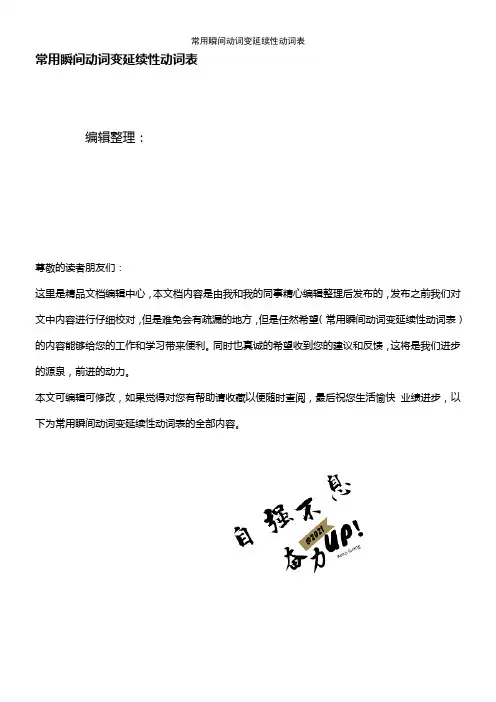
常用瞬间动词变延续性动词表编辑整理:尊敬的读者朋友们:这里是精品文档编辑中心,本文档内容是由我和我的同事精心编辑整理后发布的,发布之前我们对文中内容进行仔细校对,但是难免会有疏漏的地方,但是任然希望(常用瞬间动词变延续性动词表)的内容能够给您的工作和学习带来便利。
同时也真诚的希望收到您的建议和反馈,这将是我们进步的源泉,前进的动力。
本文可编辑可修改,如果觉得对您有帮助请收藏以便随时查阅,最后祝您生活愉快业绩进步,以下为常用瞬间动词变延续性动词表的全部内容。
常用瞬间动词变延续性动词表①have arrived at/in sp, got to/reached sp, come/gone/ moved to sp→have been in sp②have come/gone back, returned→have been back③have come/gone out→have been out④have become→have been⑤have closed/opened→have been closed/open⑥have got up→have been up⑦have died→_have been dead⑧have left sp→__have been away from sp⑨have fallen asleep/gone to sleep→have been asleep⑩have finished/ended/completed→_have been over⑪have married→have been married⑫have started/begun to do sth→have done sth⑬have begun→_have been on⑭have borrowed→_have kept⑮have bought→have had⑯have lost→haven't had⑰have put on→have worn⑱have caught/got a cold→have had a cold⑲have got to know→have known⑳have gone to→have been inhave joined/taken part in the league/the Party/the army→have beena member of the league/the Party/the army, have been in the league/the Party/the army, have been the Party’s member/the league member/the soldier。

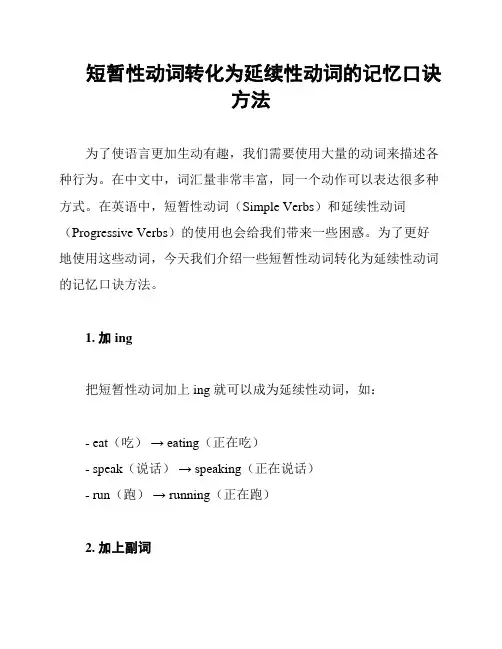
短暂性动词转化为延续性动词的记忆口诀
方法
为了使语言更加生动有趣,我们需要使用大量的动词来描述各种行为。
在中文中,词汇量非常丰富,同一个动作可以表达很多种方式。
在英语中,短暂性动词(Simple Verbs)和延续性动词(Progressive Verbs)的使用也会给我们带来一些困惑。
为了更好地使用这些动词,今天我们介绍一些短暂性动词转化为延续性动词的记忆口诀方法。
1. 加 ing
把短暂性动词加上 ing 就可以成为延续性动词,如:
- eat(吃)→ eating(正在吃)
- speak(说话)→ speaking(正在说话)
- run(跑)→ running(正在跑)
2. 加上副词
有些短暂性动词虽然不能直接加上 ing,但加上一些副词却可
以变成延续性动词,如:
- work(工作)→ work hard(努力工作)
- drive(开车)→ drive slowly(慢慢开车)
- walk(步行)→ walk quickly(快速行走)
3. 加上一些介词短语
通过加上一些介词短语也可以将短暂性动词转化为延续性动词,如:
- talk(交谈)→ ta lk about politics(谈论政治)
- wait(等待)→ wait for the bus(等待公交车)
- smile(微笑)→ smile at her(对她微笑)
使用记忆口诀方法可以更快地掌握英语动词的使用技巧,提高
我们的语言运用能力。
希望以上介绍的方法可以对大家的学习有所
帮助。
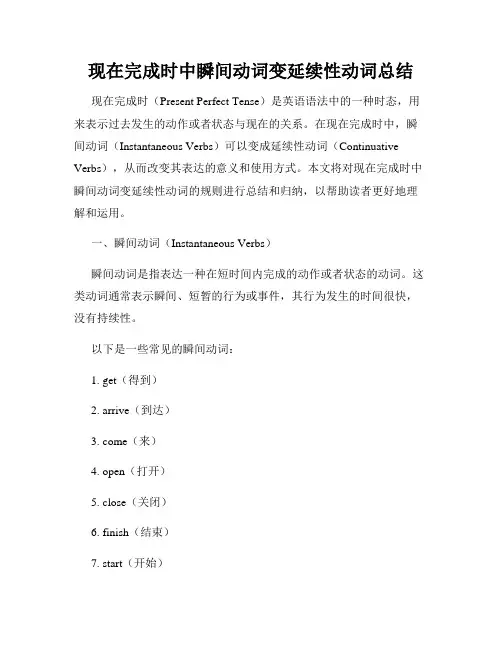
现在完成时中瞬间动词变延续性动词总结现在完成时(Present Perfect Tense)是英语语法中的一种时态,用来表示过去发生的动作或者状态与现在的关系。
在现在完成时中,瞬间动词(Instantaneous Verbs)可以变成延续性动词(Continuative Verbs),从而改变其表达的意义和使用方式。
本文将对现在完成时中瞬间动词变延续性动词的规则进行总结和归纳,以帮助读者更好地理解和运用。
一、瞬间动词(Instantaneous Verbs)瞬间动词是指表达一种在短时间内完成的动作或者状态的动词。
这类动词通常表示瞬间、短暂的行为或事件,其行为发生的时间很快,没有持续性。
以下是一些常见的瞬间动词:1. get(得到)2. arrive(到达)3. come(来)4. open(打开)5. close(关闭)6. finish(结束)7. start(开始)8. buy(购买)9. sell(出售)10. win(赢得)等等。
二、瞬间动词变延续性动词的规则现在完成时中,瞬间动词可以通过一些规则变成延续性动词,从而具有持续性。
一般而言,瞬间动词变延续性动词的方式有两种:添加辅助动词"have been"或使用"for"或"sice"引导的时间状语从句。
1. 添加辅助动词"have been"瞬间动词可以通过在其前面添加"have been"来表示一个动作或状态的持续性。
这种形式常常用于描述一个从过去某个时间开始一直延续到现在的动作或状态。
例如:- I have been living in this city for three years.(我在这个城市生活已经三年了。
)- He has been working on this project all day.(他从早到晚一直在做这个项目。
瞬间动词转换成持续性动词瞬间动词用于完成时态不能与一段时间状语连用,须转换成持续性动词。
1.用相应的延续性动词替换的有:buy---have borrow---keep put on----wearcatch/get a cold---have a coldcome/go/become---be 等。
eg. 1.We have had the TV set for 3years.2.I have kept the book for 2 weeks.2.转换成be+名词的有:join the army----be a soldierjoin the Party----be a Party membergo to school----be a student 等。
eg. 1.He has been a soldier for 5 years.2She has been a student for 2 months.3.转换成be+adj/adv.die—be dead finish—be over begin---be onleave---be away move----be out ofput on---be on open---be open close---be closed fall asleep------be asleep 等。
eg. He has been dead for 5 years.4. 转换成be+介词短语go to school----be in schooljoin the army---be in the army 等。
eg. 1.She has been in the army for 2 years.2.He has been in school for 9 years.5.通过去掉短语中的结束性动词get to know---knowbegin to study---studycome to work----workeg. 1.We have known each other for 10 years.2.He has study Chinese for 2 years.*瞬间动词完成时的否定式已成为一种可延性状态,因此可以和表示一段的时间状语连用。
延续性动词与终止性动词:动词按其动作发生的方式,动作发生过程的长短,分为延续性动词和终止性动词。
延续性动词表示的动词是一种延续的动作,这种动词可以延续下去或产生持久的影响。
如:learn,work,stand,lie,know,walk,keep,have,wait,watch,sing,read,sleep,live终止性动词也称非延续性动词、瞬间动词,表示的动作不能延续,即动作发生立即结束,产生某种结果。
在有了某种结果之后,就不能再继续下去。
如:leave,start,set out,arrive,reach,get to,begin,stop,shut,turn off,marry,put,put on,get up,wake,fall,join,receive,finish,end,complete,become,come,go,die,close,open,break,give,jump,buy,borrow等。
1.终止性动词的用法1)终止性动词可用来表示某一动作的完成,因此可用于现在完成时。
如:The plane has arrived飞机到了。
I have finished my homework.我已完成了作业。
2)终止性动词表示的动作极其短暂,不能持续,所以其现在完成时(只限于肯定式)不能和表示一段时间的状语连用。
如:①他死了三年了。
误:He has died for three years.②他来这儿三个月了。
误:he has come here for three months.①②两句中的动词die和come都为终止性动词,它们可用于完成时,但不能同表示一段时间的状语for three years /months连用。
那这两句如何译成英语呢?我们可采用下列方法:A.用能够表示持续状态的相应的延续性动词替换句中的终止性动词。
如:①He has been dead for three years.②He has been here for three months.将短暂性动词改为相应的延续性动词或短语和一段时间连用,其常用的方法有如下几种:基本变化规则a)用延续性动词代替终止性动词1、用have代替buyMy brother has had(不能用has bought) this bike for almost four years.2、用keep或have代替borrowI have kept(不能用have borrowed) the book for quite a few days.3、用be替代becomeHow long has your sister been a teacher?4、用have a cold代替catch a coldTom has had a cold since the day before yesterday.5、用wear代替put onb)用“be+形容词”代终止性动词1、be+married代marry2、be+ill代fall (get) ill3、be+dead代die4、be+asleep代fall (get) asleep5、be+awake代wake/wake up6、be+gone代lose,die,sell,leave7、be+open代open 8、be closed代close/shut9、be+missing(gone,lost)代losec)用“be+副词”代终止性动词1“be+on”代start,begin2“be+up”代get up3“be+back(to)”代return to,come back to,go back to代come(arrive,reach,get) here或go (arrive,reach,get) there等等4“be here (there)”d)用“be+介词短语”代终止性动词1.“be in/at +地点”代替go to /come to2.用be in the army 代替join the army3.“be in/at +地点”代替move toe) “ be+名词”代终止性动词join the Party /League→be a Party /League member,go to school→be a studentjoin the army→be a soldier等。
延续性动词与瞬间动词的转换一、瞬间动词也叫短暂性动词或终止性动词。
这种动词是指它们动作的开始也就意味着动作的结束,所以不能直接跟表示一段的时间状语(比如for或since引导的表示一段时间的状语或用how long 来提问)连用。
那么,如何使瞬间动词与表示一段时间的状语连用呢?此时,我们可以将当短暂性动词与一段时间连用时,就要转化为延续性动词。
二、瞬间动词与延续性动词的区别:1、用于完成时的区别1)延续动词表示经验、经历;2)瞬间动词表示行为的结果,不能与表示一段的时间状语连用。
eg. 1.He has completed the work.他已完成了那项工作。
(表结果)2.I've known him since then.我从那时起就认识他了。
(表经历)2、用于till和until从句的差异1)延续动词用于肯定句,表示“做……,直到……”2)瞬间动词用于否定句,表示“到……,才……”eg. 1.He didn't come back until ten o'clock. 他到10点才回来。
2.He slept until ten o'clock.他一直睡到10点。
三、瞬间动词到延续性动词的转换:这里对一些词做一些总结:瞬间动词可转换的延续性动词(组)arrive be herebegin/start be ondie be deadfall ill/sick/asleep be ill/sick/asleepget up be upgo out be outfinish be overput on wear或be onopen be open(adj.)join be in或bea member of…close be closedgo to school be a studentborrow keepbuy havecatch(a cold) have(a cold)get to know knowbegin to study studycome to work workget up be upleave be away from如:1.He has been a soldier for three years. 他参军三年了。
延续性动词与瞬间动词的转换一、瞬间动词也叫短暂性动词或终止性动词。
这种动词是指它们动作的开始也就意味着动作的结束,所以不能直接跟表示一段的时间状语(比如for或since引导的表示一段时间的状语或用how long 来提问)连用。
那么,如何使瞬间动词与表示一段时间的状语连用呢?此时,我们可以将当短暂性动词与一段时间连用时,就要转化为延续性动词。
二、瞬间动词与延续性动词的区别:1、用于完成时的区别1)延续动词表示经验、经历;2)瞬间动词表示行为的结果,不能与表示一段的时间状语连用。
eg. 1.He has completed the work.他已完成了那项工作。
(表结果)2.I've known him since then.我从那时起就认识他了。
(表经历)2、用于till和until从句的差异1)延续动词用于肯定句,表示“做……,直到……”2)瞬间动词用于否定句,表示“到……,才……”eg. 1.He didn't come back until ten o'clock. 他到10点才回来。
2.He slept until ten o'clock.他一直睡到10点。
三、瞬间动词到延续性动词的转换:这里对一些词做一些总结:瞬间动词可转换的延续性动词(组)arrive be herebegin/start be ondie be deadfall ill/sick/asleep be ill/sick/asleepget up be upgo out be outfinish be overput on wear或be onopen be open(adj.)join be in或bea member of…close be closedgo to school be a studentborrow keepbuy havecatch(a cold) have(a cold)get to know knowbegin to study studycome to work workget up be upleave be away from如:1.He has been a soldier for three years. 他参军三年了。
英语中瞬间动词和延续性动词一、瞬间动词和延续性动词的含义及用法:1.瞬间动词是指动作短暂、不长久的动词,如begin, become, sell, buy, borrow等。
其用法有:①常与点时间连用。
例如:She often goes to bed at ten.她经常十点钟睡觉。
②不能与段时间连用。
例如:He has joined the army for two years. (×)She has come here for half an hour. (×)2.延续性动词是指长久的、可以延续的动词,如sleep, know, keep, wait, study等。
其用法为:①常与段时间连用。
例如:Mr Zhang has lived here for two years.张先生在这儿住了两年了。
He has taught there since 1987.自1987年来他一直在那儿教书。
②不与点时间连用(do, have, eat等除外)。
例如:Mary has worked at eight. (×)She walked at five yesterday.(×)二、非延续性动词可以转换成延续性动词,主要有以下几种:三、①、用相应的延续性动词;四、buy ------ have, borrow ----- keep, put on ------ wear,五、 catch/get a cold ------ have a cold, come/go/become ------ be.六、②、转换成 be+名词;七、join the Party ------ be a Party member,八、join the army ------ be a soldier,九、go to school ------ be a student.十、③、转换成be + 介词短语 :十一、go to school ------ be in school,十二、join the army ------ be in the army.十三、④、转换成be + adj./adv. :十四、die ------ be dead, finish ------ be over,十五、begin/start ------ be on, leave (…) ------ be away (from), 十六、close ------ be closed, open ------ be open, fall asleep ------ be asleep.十七、常见的瞬间动词变为延续性动词:1、go——be away2、come/arrive——be here3、come back——be back4、leave——be away(be not here)5、buy——have6、borrow——keep7、die——be dead8、begin——be on 9、finish/end——be over 10、open——be open11、close——be closed 12、lose——be lost 13、get to know——know 14、 turn on——be on 15、get up——be up 16、sit down——sit/be seated 17、join——be in(…)或be a…member 18、become——be a19、marry—— be marrie 20、fall asleep——be asleep 21、put on——be in /wear22、catch a cold——have a cold 23、go out——be ou例句:1、他买了这本书两年了。
瞬间动词转换成持续性动词
瞬间动词用于完成时态不能与一段时间状语连用,须转换成持续性动词。
1.用相应的延续性动词替换的有:
buy---have borrow---keep put on----wear
catch/get a cold---have a cold
come/go/become---be 等。
eg. 1.We have had the TV set for 3years.
2.I have kept the book for 2 weeks.
2.转换成be+名词的有:
join the army----be a soldier
join the Party----be a Party member
go to school----be a student 等。
eg. 1.He has been a soldier for 5 years.
2She has been a student for 2 months.
3.转换成be+adj/adv.
die—be dead finish—be over begin---be on
leave---be away move----be out of
put on---be on open---be open close---be closed fall asleep------be asleep 等。
eg. He has been dead for 5 years.
4. 转换成be+介词短语
go to school----be in school
join the army---be in the army 等。
eg. 1.She has been in the army for 2 years.
2.He has been in school for 9 years.
5.通过去掉短语中的结束性动词
get to know---know
begin to study---study
come to work----work
eg. 1.We have known each other for 10 years.
2.He has study Chinese for 2 years.
*瞬间动词完成时的否定式已成为一种可延性状态,因此可以和表示一段的时间状语连用。
eg. 1.I haven’t heard from her for 6 months.
2.I haven’t bought anything for 2 months.
leave --- be away, borrow --- keep, buy --- have, begin/start --- be on, die --- be dead, finish --- be over, join --- be in+组织机构, be a member of+组织机构, open sth --- keep sth open, fall ill --- be ill, get up---be up, come here --- be here, go there --- be there, become --- be, come back --- be back, fall asleep --- be asleep, get to/ arrive/reach --- be (in), leave --- be away from, get to know --- know, go (get) out →be ou t,put on→ wear;catch a cold →have a cold,get married---be married等。